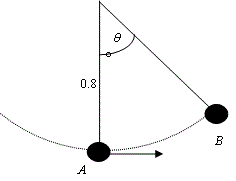Solution 17.7b
From Mechanics
(Difference between revisions)
(New page: Image:17.7.gif) |
|||
| (2 intermediate revisions not shown.) | |||
| Line 1: | Line 1: | ||
| - | [[Image:17. | + | [[Image:17.7d.gif]] |
| + | |||
| + | The kinetic energy of the particle at <math>A</math> is converted to potential energy at <math>B</math>. | ||
| + | |||
| + | Using the result of part a) | ||
| + | |||
| + | <math>\begin{align} | ||
| + | & 0\textrm{.}036=0.05\times 9\textrm{.}8\times (0\textrm{.}8-0\textrm{.}8\cos \theta ) \\ | ||
| + | & \cos \theta =0\textrm{.}908 \\ | ||
| + | & \theta =24\textrm{.}7{}^\circ \\ | ||
| + | \end{align}</math> | ||
Current revision
The kinetic energy of the particle at \displaystyle A is converted to potential energy at \displaystyle B.
Using the result of part a)
\displaystyle \begin{align} & 0\textrm{.}036=0.05\times 9\textrm{.}8\times (0\textrm{.}8-0\textrm{.}8\cos \theta ) \\ & \cos \theta =0\textrm{.}908 \\ & \theta =24\textrm{.}7{}^\circ \\ \end{align}

